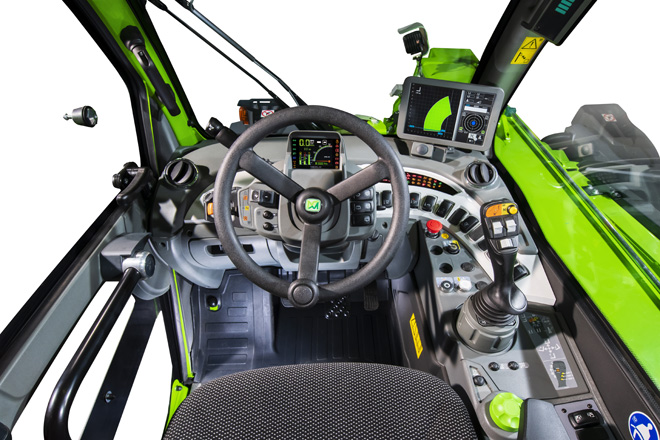Available in the Light and Premium versions, the active and adaptive system checks all the operating parameters in real time, and allows the operator to work in total safety, thus maximising the potential of both the telehandler and the attachment being used.
For Merlo - a metal engineering company specialising in the production and marketing of telescopic boom handlers, both fixed and with rotating turret, self-loading concrete mixers, forestry tractors and tracked vehicles - safety is one of the pillars of the way in which the machines produced are designed and offered to the market. This means creating the conditions for ensuring a work situation where the risk of accidents is minimised for the operator and anyone in his/her vicinity.
With this in mind, we at Merlo work to come up with innovative solutions aimed at improving the performance and efficiency of our machines, while at the same time reducing every possible risk posed to those in the cab or in the vicinity of the telehandler:
"Designing, manufacturing, and selling safer machines: this is our commitment and our moral duty to those who work with our telehandlers every day, all around the world.", claimed Fabio Garino, Product Manager at Merlo.
In this regard, one of the most important innovations is Merlo's ASCS, the Adaptive Stability Control System, a system that is now well-established and appreciated by the market and which in 2017 received a special mention in the Samoter Innovation Award precisely for the extreme attention to safety dedicated in the design of the machine and for the integration of devices aimed at making the operator's work safer and easier.
Merlo’s ASCS is an active and adaptive safety system that checks all the operating parameters in real time, and allows the operator to work in total safety, thus maximising the potential of both the telehandler and the attachment being used. Its operating principle is based on three fundamental parameters, measured by means of special sensors: the load being handled, i.e. the weight (in kg) of the material being handled; the position of the load, i.e. the distance of the load from the machine; the attachments in use, which are recognised automatically, thus enabling optimisation of the stability calculation and the load diagram.
The ASCS system is available in two versions: Light and Premium. The Light version guarantees a high level of safety, checking the operating parameters of the telescopic handler in real time in order to improve its stability. The Premium version has a 10-inch display for viewing the various operating parameters, the load diagram, and for setting the machine’s countless functions. The ASCS Premium's navigation system is operated via a knob located on the right-hand armrest near the joystick. The Premium version of the ASCS also includes a number of variants, such as hydraulic fluid continuous delivery and auxiliary lock, in addition to the display features. Attachments are recognised by means of a sensor that allows the working limits to be adjusted, always with the utmost attention to safety and stability of the machine, thus simplifying the use of the machine even for less experienced users. For rotary models, there are additional displays and possible settings, such as all those related to turret rotation and the 4 stabilisers.
In addition to safety, the ASCS Premium system offers several features related to machine operation. These include those related to geometric and Cartesian working limits, which allow, for example, the setting of minimum and maximum limits for boom upstroke or downstroke, or the definition of the working area, and the load storage, which is particularly useful for handling loads of different sizes.
Finally, there is also a function dedicated to use with a bucket which, when recognised by the system, automatically activates the free zone, i.e. the area within which it is possible to operate without the control system blocking the movement of the attachment in the event of overloading.
